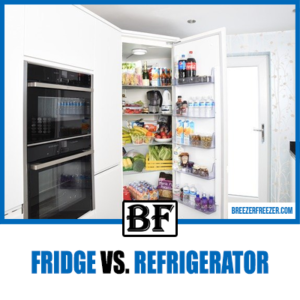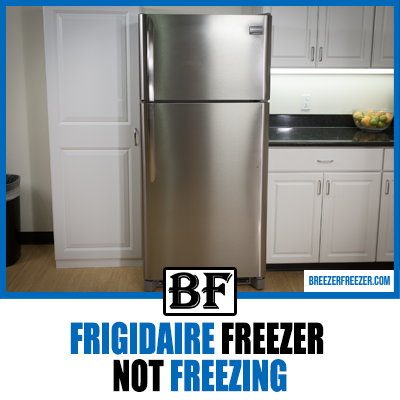Fridge vs. Refrigerator
Are fridge and refrigerator the same? Is there any difference? If you have been scratching your head over these questions, our article will help you find the answer and also make you understand commonly asked questions such as:
- Fridge vs. Refrigerator
- What are the differences between a fridge and a refrigerator?
- Which is better? Fridge or Refrigerator?
In terms of names and spelling, the fridge is a shorter version of the refrigerator. In contrast, a refrigerator is seen as the more formal word for the appliance.
Though technically interchangeable, both have their differences. A refrigerator is more extensive and has compartments and a freezer, whereas a fridge is smaller and doesn’t have a freezer. There is no specific answer to whether a refrigerator or fridge is better as it depends on the use and the requirement.
The history behind fridge and refrigerator
If you want to understand the dynamics between the fridge and refrigerator, we need to revisit history. Frigidaire, a company that needs no introduction, is one of the US’s oldest and largest commercial home appliances.
Earlier it was known as Guardian Fregerator Company, but with rebranding and renaming it to Frigidaire, the term fridge started gaining immense popularity, especially with the company’s initial models.
With more progress in technology and models designed by the company, which were unique and modern, these models were known as refrigerators.
Fridge vs. Refrigerator: Are they different?
Now that we have walked down history to understand how both terms came into existence, let’s look into how different a fridge and a refrigerator are.
Fridge
The fridge is commonly known as a casual slang for the refrigerator as the word seems easier to write or spell. Fridge also became the crowd’s favorite term of addressing refrigerator precisely due to its design as it is compact and convenient.
The fridge comes in smaller sizes than refrigerators and is usually without the freezer feature, so the fridge was formed.
Moreover, they run on lower power, and you will casually find them in hotel rooms or bars as they aren’t portrayed as household appliances.
Refrigerator
Refrigerators are cooling devices commonly categorized as household appliances. They come in two sections for supporting various temperatures.
The more oversized compartment delivers a cool temperature above the freezing point of water that is 3-5 degrees celsius for storing food items along with biodegradable goods.
Furthermore, the other compartment, which comes in a smaller dimension, is a freezer with its temperature beneath the freezing point. Overall, it is a combination of a refrigerator and freezer.
What differentiates the fridge from the refrigerator?
As mentioned above, we have lightly discussed what identifies as a fridge and a refrigerator. Here we will discuss it in detail and explore the broader spectrum of both units.
Appliance presentation
- Refrigerators are an improved genre of fridges as they are more robust and designed with better features than fridges.
- Refrigerators come with in-built freezers and are more significant, due to which, they are prevalent in residential space and commercial infrastructure.
- Despite fridges being accessible in different dimensions, they have no freezers installed, making it a compact unit.
The contrast in temperature and utility
- You can maintain a specific temperature in a refrigerator due to two separate compartments. The more oversized compartment can keep your food items chilled, and the freezer compartment can freeze the goods.
- In fridges, you can raise enough temperature to cool your items by sustaining a standard temperature.
- The conservation quality in refrigerators is higher compared to fridges due to vast differences in technology and features.
Variance in purpose
- The main objective of fridges is to preserve items on quality temperature and storing enough items.
- Fridges are idle for storing bread, packaged goods, water, carbonated beverages, and more.
- In refrigerators, you can preserve articles at high-standard temperatures and hold a large number of items.
- Refrigerators are the best choice for keeping vegetables, meat, dairy products, and more.
Should you use a fridge?
Going by the differences in features and technical aspects, even if the fridge looks like it’s on the lesser advantage, we cannot simply ignore or come to a decision that you shouldn’t use a fridge.
A fridge is as crucial as a refrigerator due to its specific specialty. It is handy in storing particular items and can meet up to the expectations without causing any inconveniences.
You can take mini-fridges as an example. They fall under the fridge category and are a great way of saving electricity. Mini-fridges lose less cold air compared to refrigerators due to their tiny size.
They are also easier to access and better at organizing your storage. If the statement has encouraged you to consider getting one, make sure to research the energy star ratings along with the consumer reports.
Which is the finest? Fridge or refrigerator?
Even after debating the differences between a fridge and a refrigerator, it is still hard to single out one and tag the better unit than the others.
Why? Because it is a subjective choice or an individual’s preference depending on the need and requirement of the appliance.
For example, if you require preserving sufficient food, a fridge can work perfectly for you. Also, if you are looking for a compact fridge due to space constraints, it is evident you would go for a fridge rather than a refrigerator.
In a similar case, if you require to store a large quantity of food or a frequent need for a freezer arises, your first choice will be the refrigerator. Hence, there isn’t an accurate answer to the question above.
Conclusion
In the end, it depends on an individual to decide on which unit to choose. Both the appliances can equally bring out the best results for which they were specifically designed.
So make sure you make a list of what works and what doesn’t. That way, you can make the right choice.

![Westinghouse Fridge Not Cooling [Quick Fix]](https://breezerfreezer.com/wp-content/uploads/2022/08/Westinghouse-Fridge-Not-Cooling-Quick-Fix-.png)


![Is Your GE Refrigerator Making Loud Humming Noise? [Solved!]](https://breezerfreezer.com/wp-content/uploads/2023/11/Is-Your-GE-Refrigerator-Making-Loud-Humming-Noise.png)

